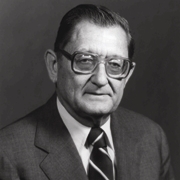In the long march of freedom, many people have made sacrifices, and remembering these sacrifices and accomplishments is an important way to inspire and educate the next generation about the demands of liberty.
A case in point is the TFAS Rowny Paderewski Scholarship Program, honoring the Polish patriot who played a prominent role in world affairs. TFAS supporter Edward L. Rowny, former Ambassador and retired U.S. Army Lieutenant General, established this scholarship in 2004 to bring one Polish university student to a TFAS institute each year. As TFAS students, these young Polish leaders study American democracy and the free market system. To date there have been nine outstanding Paderewski Scholarship winners.
For Rowny, an appreciation of Paderewski and the contributions Poles have made to the cause of liberty was a family affair. His father emigrated to the U.S. from Poland in 1912, and his mother was the daughter of prominent Poles who had arrived in 1860. As a child, Rowny heard about the exploits of the great Thaddeus Kosciuszko, another Revolutionary hero and the designer of West Point, and his grandmother instilled in him an early appreciation for Ignacy Jan Paderewski, a Polish statesman, pianist and composer. In 1919, the Versailles Peace Treaty was signed with Paderewski serving as Poland’s Prime Minister
In 1936, as a junior at Johns Hopkins University, Rowny was awarded a scholarship to attend a semester at the Jagiellonian University at Krakow. While there, he traveled to the 1936 Berlin Olympics and not only saw Jesse Owens win four medals, but observed the rising militarism of Hitler’s Germany. Convinced that war was inevitable, Rowny graduated from Johns Hopkins, resigned a reserve commission, and entered West Point in 1937.
In 1939, Paderewski returned to the concert stage after serving two years as the Polish Premier. When Hitler invaded Poland, Paderewski was in the United States and once again worked for the cause of Polish liberation. When Paderewski died on June 29, 1941, President Roosevelt bestowed the nation’s highest honor on him, ordering that he be buried at Arlington National Cemetery, where he would lie until Poland was once again free.
Rowny, a newly commissioned second lieutenant, attended Paderewski’s funeral, and when his grandmother heard Roosevelt’s pledge, she made the young man promise to help see it through.
Rowny would go on to fight in Africa and Italy in World War II, and later saw service in the Korean War. In 1963, as a brigadier general, he was responsible for testing new counterinsurgency concepts in Vietnam, including the first armed helicopters. Rowny’s army career continued with commands at the division and corps-level.
From 1973 to 1979, Rowny was the Joint Chiefs of Staff representative at the Geneva SALT II negotiations, and in this capacity he served longer than any other delegate. Rowny retired from the Army in 1979.
This retirement was short-lived. From 1981-1984, Rowny was the chief U.S. negotiator at the Strategic Arms Reduction Talks (START), and as head of START, Rowny held the rank of ambassador. From 1985-1990, Rowny was Special Advisor for Arms Control to Presidents Reagan and Bush.
Throughout this distinguished career, however, Rowny never forgot his promise to his grandmother, or the example and principles of Paderewski.
In 1985, as part of his diplomatic service, Rowny went to Poland with a special message for General Jaruzelski and Solidiarity leader Lech Welesa. Reagan, Rowny was told to convey, looked forward to honoring Roosevelt’s pledge. Later, in 1988, Rowny passed another message to Mr. Walesa – that when he became President of Poland, Paderewski’s body would be returned.
On June 29, 1992, on the 51st anniversary of Paderewski’s death, President George H. W. Bush made good on that pledge. Former Ambassador Rowny was called into service one more time, and he organized the return of Paderewski’s body from Arlington to his beloved Poland aboard Air Force One. Paderewski’s heart, however, remains here in America as per his final instructions.
In Warsaw, there was a long procession to the baroque Royal Castle, Zamek Krolewski, where Paderewski lay in state for the next several days. Finally, in a moving ceremony in a square in front of the Castle, President Bush formally returned Paderewski home to a free and democratic Poland.
Gen. Rowny has answered the promise he made in 1942, but today he is committed to ensuring that Paderewski’s ideals—his exemplary service and the principles he stood for—are not forgotten. Rowny established the Ignacy Jan Paderewski Scholarship Program at The Fund for American Studies. This scholarship enables Polish students to attend TFAS programs in Washington, D.C., and includes tuition and housing.
“This scholarship is really a tribute to two people,” TFAS president Roger Ream said, “It honors Paderewski, but it also honors the extraordinary career of the great American who has made it possible.”
In 2007, TFAS presented Gen. Rowny with the Walter Judd Freedom Award in recognition of his efforts to advance freedom in the United States and abroad.
To learn more about the Paderewski Scholarship Program, or to make a contribution visit www.TFAS.org/Paderewski.


